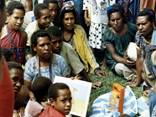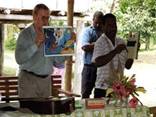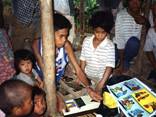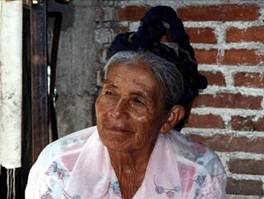History of Joy Ridderhof
The Beginnings of Evangelism through Audiovisual Media
 Summer 1937: Joy Ridderhof, a missionary in Honduras for six years, is on leave in Los Angeles and is bedridden, very ill (malaria and dysentery).
Summer 1937: Joy Ridderhof, a missionary in Honduras for six years, is on leave in Los Angeles and is bedridden, very ill (malaria and dysentery).
During the fall and winter, she often remains bedridden; despite medical care and fervent prayers, there is no improvement in her health.
Her thoughts constantly turn to this country where she has remained for six years, and there is something there that obsesses her; she had (driven by divine concern) visited a poor widow with children. The latter had eagerly accepted the message of salvation, along with her daughter-in-law, during Joy's second visit to them before her return.
The widowed woman was beginning to suffer persecution from her peers, and one thought obsessed Joy: "If I could only make her memorize one verse from the Bible, and make her know it well, it would be a weapon for her against sin and temptation."
So she went back and tried to make her memorize a verse. It was very difficult; the woman was weakened by deprivation, lack of food, worry, and anxiety, and as she left, Joy thought: "What a pity I couldn't leave her my voice, which would have repeated the same words over and over again, and in the end, it would have remained engraved in her memory."
Joy returned to Los Angeles. Despite unfavorable medical results, she thought: "I must rejoice, God is going to do magnificent things. She thanked the Lord, until, through a deliberate act of faith, joy and expectation overcame her disappointment."
She burned with a burning desire to do something for all those isolated and ignorant people scattered across the mountains of Honduras, then suddenly, her mind flashed back to the bars there, where the harsh, nasal sounds of gramophone records reached and captivated people.
The idea then germinated to publish gospel records in Spanish; This was the first step in a long series, and a long process, to discover the best recording organization, the best packaging and shipping methods, the best phonograph, and finally the hand-cranked cassette player, but I'll come back to that later.
After releasing the Spanish-language records—I'm keeping it short, of course—the small team (because Joy had surrounded herself with volunteer collaborators) traveled to different locations to expand the work.

She traveled to the Philippines and Alaska. Requests for records poured in from everywhere: Peru, Chile, Puerto Rico, Colombia, etc.
There were incredible blessings, but also challenges; Joy knew she had to face the inevitable spiritual conflict that is inseparable from any penetration into the territory of the Prince of Darkness. This would present itself in all sorts of forms: delays, frustrations, perplexities, deceptions from suspicious natives, sudden and inexplicable illnesses, and so on, and sometimes also certain difficulties in clearly discerning the divine will.
To give you an idea of the progress of the task accomplished: In May 1940, 11 double-sided records were ready for shipment.
By 1958, 2 million records had been published and shipped, recording 1,904 languages—and this, let's not forget, with the means available at the time!
Joy's entire life was driven by this motto: Rejoice, even if you feel like giving up, remember God's promises, praise Him for the great things He will still do for us by granting us victory.

We continued the journey. The needs of the Navajo Indians of Arizona were explained to Joy; the vision was very vast. She set out on this new path. As soon as she was convinced that this command came from God, she no longer hesitated. Lord, she said, I will make recordings in as many languages as you desire, and I trust in you for everything I need in this endeavor. I will follow you in this regard as far and to as many peoples as you wish.

The team then continued, also returning to Honduras. From now on, it will be a question of traveling recorders, language hunters. There was also the purchase of a tape recorder to replace the bulky recording equipment. And all this by faith and thanks to donations. Someone said: "The secret to receiving great things from God is being able to wait and hold on for the last half hour."
Here is an example of how a recording takes place, after some experience, of course:
Four people side by side, Joy takes the microphone and speaks. She then passes the microphone to the missionary next to her. She repeats the same sentence in the Ibanog language to the little old man who listens attentively and pronounces the same words in his own dialect. Then the young Negrito who understands this language (the Negrito Palanan) translates aloud into his own language the sentence he heard.
You can imagine the reaction of the two when their own voices were played: it was explosive, hilarious laughter that nothing could stop. It takes hours to record the entire message. Everything the Negrito says is verified and translated into English.
Of course, this will change the lives of the missionaries, who felt helpless in the face of these people whose language they didn't speak.
The small team then set about finding a small tribe of endangered pygmies, called the WAKINDIGA, and providing them with records. You can imagine everyone's joy. Those evenings, under the African sky, by the light of the stars, the little bush dwellers listened breathlessly to the voice of their own leader, announcing that the Lord Jesus in heaven loved them and promised them peace and joy of heart if they trusted in Him.
Later, and finally, the team came up with the idea of publishing the contents of the records in book form with the aim of encouraging the natives to learn to read. Each record was copied word for word. There are already books for teaching reading, but some people are too proud to use them and submit to this method, so they prefer to learn to read from records.
I would like to return to the question of the phonograph, which was a very worrying subject for Joy. She said to those around her: "Pray that God will help us and enable us to build a cheap, hand-operated phonograph without a motor, which anyone can operate, and whose mechanism does not easily break down."
So she shared this pressing need with a new collaborator, Stuart Mill, who took it seriously; at the same time, he was traveling to record the languages of the Solomon Islands.
Finally, in 1957, in Australia, a result was achieved after numerous trials: a phonograph in a tiny box, at a reasonable cost, a solid instrument, without a motor, light to carry, with a record making 78 revolutions per minute and no more, regardless of the speed at which the handle was turned.
It was sometimes used continuously for a month straight. He walked all night through the villages, and those who had brought it complained of not being able to sleep!!
In Switzerland, Daniel Grossebacher met Joy and got involved. He traveled all over Africa and recorded a large number of languages.
Then, in the 1960s, Élisabeth de Benoît and Pierre van Woerden joined the mission.
Jean-Marc and Hélène Leuthold (Switzerland) launch "Audio Gospel" (the former name of Audio Vie). The work continues thanks to the Lord's faithfulness.
To conclude this story, I would like to share with you what Joy answered when asked what she believed to be the secret of this blessed activity; what do you think she answered?
Sing to the Lord a new song; sing his praise to the ends of the earth.
For Joy, praise and thanksgiving were above all else. It was the song of faith.




NB: We still use Joy Ridderhof's old manual written for the recordists